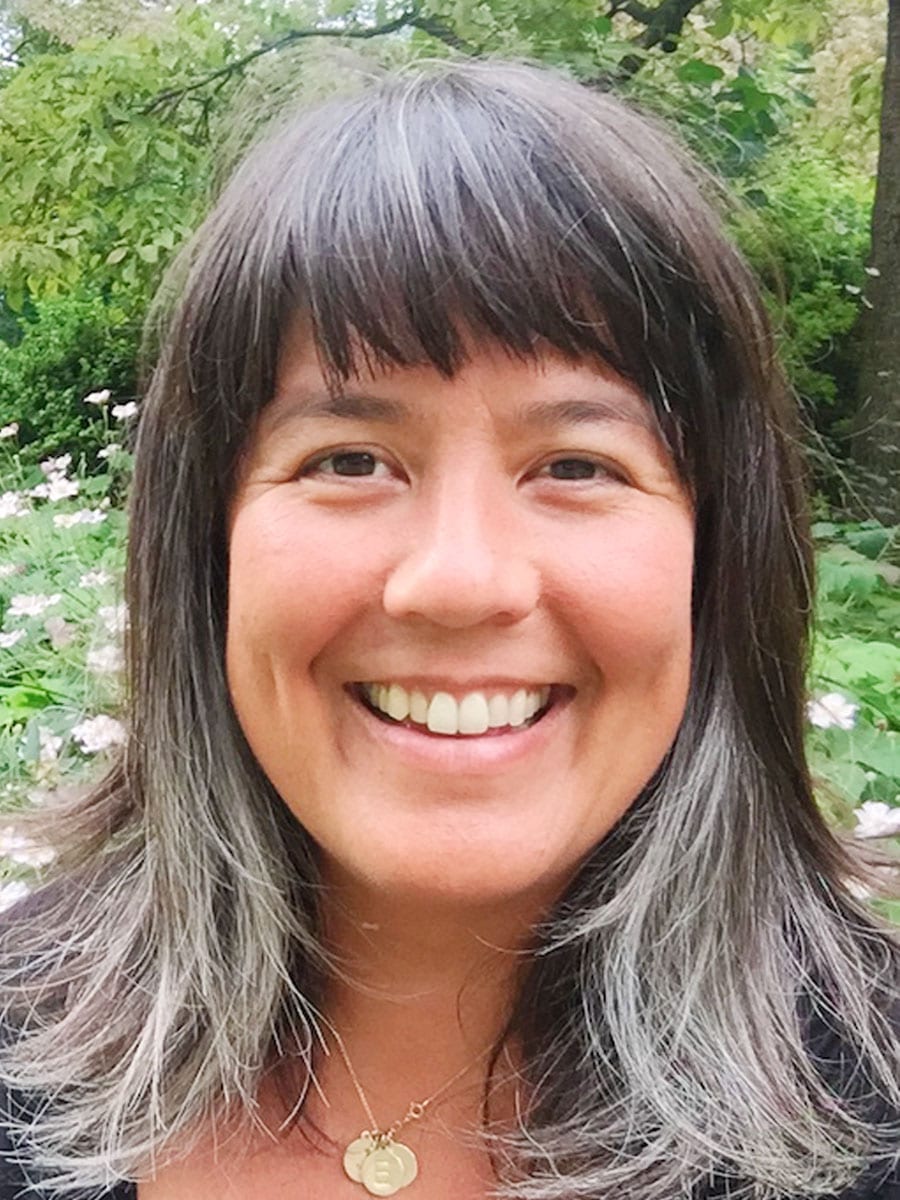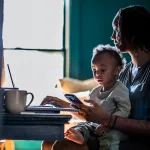Several years ago, when Wendy Chun-Hoon was working to pass paid sick and family leave policies in states across the country, she was suddenly struck with a realization that her own family wouldn’t be able to access the benefit.
The Supreme Court had not yet ruled on marriage equality — that ruling came in 2015 — and Chun-Hoon and her wife, Emily, couldn’t take time off work to help the other heal from childbirth or bond with a new child. This was because of the way families were defined in policy — often written to just include a married spouse of a different sex, a parent and a child. Even since the ruling, which recognized same-sex marriage, families continue to be narrowly defined in state and local policies.
“How I felt at the time was, ‘Oh my goodness, this paid leave work is taking off.’ And then with a couple of wins under my belt, I thought, ‘Wow, my own family would not qualify. What do I do about that?’” Chun-Hoon told The 19th.
That experience helped inform the trajectory of her work shaping paid leave policies across states through her role as executive director of Family Values @ Work, a network of grassroots groups. The organization has been involved in more than 60 paid leave policies across states and localities and has written a more inclusive definition of family to include any “individual related by blood or whose close association with the employee is the equivalent of a family relationship.”
Now Chun-Hoon is bringing that experience to a new role as the director of the Department of Labor’s Women’s Bureau. Chun-Hoon was appointed to the position by President Joe Biden on February 1.
The bureau is responsible for collecting and disseminating data on women, issuing grants to improve women’s relationship with the workforce and helping inform policies like the ones Chun-Hoon has worked on all her career. She joins the administration at a time when women in the workforce are facing more difficult circumstances than ever before: The country’s child care infrastructure has failed a generation of working mothers, many of whom have been forced out of the labor force. It’s also a time when policies such as paid leave are being discussed heavily, with several Democrats looking to expand it to a national policy in upcoming stimulus packages.
The 19th spoke to Chun-Hoon about her priorities for the role and the opportunity to bake in inclusivity from the start.
This interview has been edited for length and clarity.
Coming from the world of advocacy and philanthropy, what do you see as your big opportunities here to change things that you’ve been fighting for for a really long time?
We have an enormous challenge right now. Women have been incredibly impacted by COVID, and specifically women of color. And so the opportunity needs to be as responsive to the scale of the challenge right now. This is a moment where we’re having a conversation about jobs and infrastructure, and we better be talking about connecting women and women of color to those pathways to good jobs.
Half of the picture is, what’s happened to women in COVID in this moment? And how do we really just change the trajectory? The other half of me is looking at occupational segregation and women’s education, and structural racism in our country that leads to occupational segregation. Many women, specifically women of color, are in the jobs that stand up the rest of the economy — child care, elder care, care for disabled folks — and those need to be good jobs. That care infrastructure ought to be equally on our mind.
For me, there’s a third pillar, which is, we have lacked certain policies that we absolutely know contribute to gender, racial and economic justice. And the lack of them has perpetuated and exacerbated racial, gender and economic inequality — things like the lack of paid leave, the lack of adequate, accessible, affordable child care, the lack of the same for elder care, gaps in unemployment insurance. Attention needs to be paid on how the lack of those things have actually contributed enormously to racial, gender and economic inequality.
I’m thinking really on those three big pillars and just recognizing women’s employment situation. I mean, the “she-cession” — everybody’s talking about that. Women’s labor force participation is at levels of 30 years ago. There are 4 million less women in the workforce today than just the year ago. The situation is a lot more dire for African-American women, for Hispanic women, than what’s happening for White women. And it’s true for moms.
Last year, the bureau was really involved in facilitating conversations about caregiving and finding better ways to support moms. How do you envision your role in that and do you have any specific plans? What role can the bureau play in addressing the caregiving crisis?
I think the bureau has a couple of superpowers. We have a strong command of the research when it comes to women and women in the workforce. This week we were listening to and talking to stakeholders about the kinds of data and research that we currently deliver and how we can really get that out there so that there is better information as people are forming strategies, as local governments are forming strategies, as foundations are forming strategies.
There is a big need to answer: What happened to women in this past year? And what are the nuances of that? And let’s not talk about just women as an aggregate, let’s be really clear about race, disability/ability status, about immigration status, about LGBTQ+ and other identities. So I think that’s a superpower: our ability to apply that to policy analysis and really be a good listener, but also be a good convener to really inform as broadly as possible discussions that are happening now.
The Women’s Bureau sparks innovation through our grant making program, which is a unique quality. Having worked with the Women’s Bureau several years ago, they invested in paid leave. So the specific investment was around helping states and locales figure out, if they wanted to design a paid leave program, how would they do it? What would the cost analysis be? What would the implementation look like? Those paid leave grants that the Women’s Bureau put out were incredibly important to the field and really helped accelerate the conversation about paid leave.
I know paid leave is a big one for you. Last year, the bureau requested public comment on access to paid leave. Have you looked at those results and what are you planning to do with that information? Secondly, where do you see opportunities for the bureau to help expand paid leave, now that there is a big national conversation on it?
[In designing those programs at the state level, one thing that] became obvious from that vantage point was how you actually ensure that you’re getting equitable results based on the program’s design. And so things like adequate wage replacement, making sure that those who are earning the least are able to actually get as close to full wages as possible because otherwise, how would they afford to take the leave? Making sure that people can return to the work that they need to take a break from — that those jobs are protected and folks don’t face retaliation on the job. So equity in the sense of making sure that family members are inclusively defined, because we all form our families differently, always have, there’s a great deal of diversity in that. Equity in terms of making sure that these programs are universal — that everybody can participate in them.
This administration, certainly me in this role, and widely across the Department of Labor, the attention is on what does the design need to be in order to get the kind of equitable results that we’re seeking?
That was certainly informed by the request for information from the department. Those are the kinds of lessons that came through. And in looking back last year to the very first package that passed, the Families First Coronavirus Response Act, and the way in which the emergency paid leave provisions passed, and then fast forward to what people observed along the way — it was certainly important for those who could qualify, or who were deemed eligible — but it left out large numbers of folks. If you want to actually have the kind of economic impact and health impact that we need to have, you have to include everybody.
It got included in the American Rescue Plan in terms of observing that you have to actually cover everybody for it to have the intended impact. But it’s still optional. And in that way, I would say that that is not necessarily paid leave — that is, [it’s] a reimbursement for those who can access it. We really have learned from what those principles need to be in a program for it to actually reach everyone and have it have its intended impact. And I think there’s a lot of focus on that.
Several members of Congress have talked about wanting to reintroduce an expansion of paid leave in either the next package or perhaps as a standalone piece of legislation. Does the bureau have any role in shaping those policies?
There are a couple of places within DOL, with the Chief Evaluation Office and the Women’s Bureau, that routinely take a close look at how people are using FMLA — the Family Medical Leave Act — which is the one policy in the books on this.
Here’s the thing: the most current round of data is still pre-COVID. We know things from 2018, 2019; the next data set is yet to come. There is a lot of need that is not being met when it comes to access to paid leave. And I know from personal experience that need only got greater in COVID.
What we’re looking forward to is really filling out that data picture. Obviously, you’ve got to work with the data you have, and we’re actually talking right now about how we can go about understanding the picture from last year, how it comports with the data that we had from the year before and really trying to bring that kind of understanding out as quickly as it’s available.
Your own family was excluded from paid leave policies because of the ways that families were defined. How are you thinking about LGBTQ+ representation within the Women’s Bureau so that all women feel represented?
I had an opportunity to say at the beginning of March to peers across the agency, ‘This is Women’s History Month and by women we mean all who identify as women, including those who are cisgender, transgender, femme, gender nonconforming, gender nonbinary.’ And just said it. That’s very much the spirit of [the administration] and we are getting the working groups up and going and, and really digging in. I would say it applies wider than the Women’s Bureau that feels exciting and really important.
[There has to be a lot of] investment in building relationships across reproductive justice leaders, racial justice leaders, disability justice leaders, economic justice leaders, certainly labor, LGBTQ+ justice leaders. Really just saying, ‘If it were designed to include all of us, what would it look like?’ And making sure that a very inclusive family definition starts to get hardwired into all kinds of public policy, including family policy.






